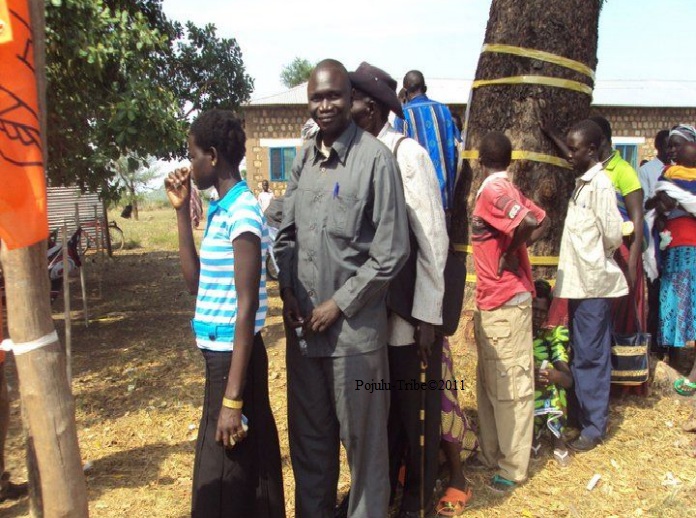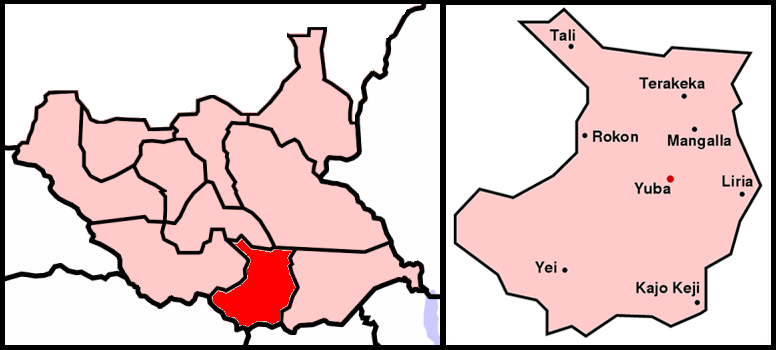|
Yei
Yei River County is an administrative area in Central Equatoria with a large population of people who settled in that particular county. Aggrey Cyrus Kanyikwa is the current commissioner for Yei River County. He was appointed by President Salva Kiir Mayardit as recommended by former Central Equatoria State Governor, Emmanuel Adil Anthony. Yei has had many communities including the Pojulu, kakwa, Mundu etc, Welcoming businessmen and investors as it grows. Demographics Yei River County is divided into smaller sub-regions (payams). As of January 2023, there are five payams: the Yei Town payam, the Otogo payam, the Mugwo payam, the Tore payam, and the Lasu payam.The county was divided into four counties in April 2016, however, in 2020 the divided counties were all reverted back and merged into Greater Yei River County as follows below: # Lainya # Morobo # Kajo-keji Yei River County Payams Mukaya Payam 1-Dimu togeleng (D1) 2-Dimu tomurek(D2) Mugwo Payam Mountains ... [...More Info...] [...Related Items...] OR: [Wikipedia] [Google] [Baidu] |
Yei River State
Yei River State was a state in South Sudan that existed from 2 October 2015 to 22 February 2020, when it became a part of the state of Central Equatoria. Location The state was located in the Equatoria region and bordered Maridi and Amadi to the north, Jubek to the northeast, and Imatong to the east. Yei River State, along with Jubek State and Terekeka State was part of the former state of Central Equatoria. The capital and largest city of Yei River State is Yei, South Sudan, with the city having an estimated population of 260,720 in 2014. History On 2 October 2015, President Salva Kiir issued a decree establishing 28 states in place of the 10 constitutionally established states. The decree established the new states largely along ethnic lines; however, a number of opposition parties and civil society groups challenged the constitutionality of the decree. Kiir later resolved to take it to parliament for approval as a constitutional amendment. In November of that year ... [...More Info...] [...Related Items...] OR: [Wikipedia] [Google] [Baidu] |
Lainya County
Lainya is a county in Central Equatoria State, South Sudan.Full list of Kiir's proposed new 28 states in S Sudan Radio Tamazuj Hon Robert John Lasu is the current commissioner of Lainya County after seven commissioner's, Administration and Logistics the importations Administration areas in lainya county are basically in payams and boma. payams. # lainya payam. # Kenyi payam. # Kupera payam. # Mukaya payam. # Wuji payam. Roads: Lainya is situated on the main road that connects Juba to the northeast and Yei to the sou ...[...More Info...] [...Related Items...] OR: [Wikipedia] [Google] [Baidu] |
River Yei
River Yei is a river in South Sudan with its source in Panyana Village, Lujule payam in Morobo County of Central Equatoria State. Nomenclature The name Yei was derived from the word ''yii'' in Kaliko language, meaning "water." Features Central Equatoria In Central Equatoria, the river flows through Lujule, Morobo County and Yei River County. The river flows through Yei town where the Kembe River joins along Yei - Juba Road. Aga fall is on River Yei located in wudabi Payam of Morobo County in Central Equatoria State Western Equatoria In Western Equatoria, the river flows through Mundiri west, Lake State, and Unity State. History In 2011 the government of Central Equatoria State under the leadership of Governor Clement Wani Konga planned to launch a power plant in Morobo County Morobo is one of the six Counties of South Sudan, counties in Central Equatoria state, South Sudan. Morobo County borders Uganda and Congo. The county is mainly occupied by Kakw ... [...More Info...] [...Related Items...] OR: [Wikipedia] [Google] [Baidu] |
Pojulu People
The Pojulu (or Pojulu people) is a tribe of the savanna lands in the White Nile Valley, in the Equatoria region of South Sudan. They are Nilotic people and part of the Karo people—which also includes Bari, Mundari, Kakwa, Kuku, Nyangwara, and the Karo Tribes Of Omo Valley in Ethiopia such as the Banna, Hamer, Mursi, Kara, Dassanech, Arbore, Nyangatom known as the Omo Karo peoples. The Pojulu differentiate into smaller clans of Nyori, Morsak, Wonduruba, Mukaya, Goduck, Lobora, Moje, Mulusuk, Pirisa, Malari, Mankaro, Sadim, Jomi, Nyigo, Komojok, Limbe, Mundu, Jebele, Maranga, Donni, Gokoni, Borri, Moyita, Gojang, Liggi, Soka, Yondoru, Mijibura, Wande , Wuji, nyainga, kweresak ,Mundu ,Dongoro, Lumuro, Soka, Jamara, Gbotoro ,Yaribe, Morsak, Gerim , Wolungu, Rongat , Mornyang , Bori, Goromu,, Mugga, Giwaya, Pokula, Limbe, Gokiri, Muring, Wolungu, Lowinya, Mojumalat, Kupera and many more. Geography The majority of the Pojulu population are located in Lainya county of C ... [...More Info...] [...Related Items...] OR: [Wikipedia] [Google] [Baidu] |
Central Equatoria
Central Equatoria is a states of South Sudan, state in South Sudan. With an area of , it is the smallest of the original South Sudanese states. Its previous name was Bahr al-Jabal (also Bahr-el-Jebel), named after a tributary of the White Nile that flows through the state. It was renamed Central Equatoria in the first Interim Legislative Assembly on 1 April 2005 under the government of Southern Sudan (2005–2011), government of Southern Sudan. Central Equatoria seceded from Sudan as part of the South Sudan, Republic of South Sudan on 9 July 2011. The state's capital, Juba, is also the national capital of South Sudan. On October 2, 2015, the state was split into three states: Jubek State, Jubek, Terekeka State, Terekeka, and Yei River State, Yei River. The state of Central Equatoria was re-established by a peace agreement signed on 22 February 2020. Administrative divisions Central Equatoria, like other states in South Sudan, is subdivided into counties, which are further divid ... [...More Info...] [...Related Items...] OR: [Wikipedia] [Google] [Baidu] |
Emmanuel Adil Anthony
Emmanuel Adil Anthony is a South Sudanese politician and the governor of Central Equatoria State since June 29th, 2020. Early life and education Adil is an ethnic Kakwa. President Kiir appointed Adil as the governor of Yei River State on February 16, 2018, replacing David Lokonga Moses. As governor, Adil said he wanted to restore peace and stability to Yei River State by reconciling with armed groups. Adil reshuffled his cabinet and replaced some county commissioners around June 17th, 2018. Political career R-ARCSS Involvement Adil supported the peace agreement in August 2018 that aimed to end the South Sudanese Civil War. South Sudanese refugees began returning to Yei River State from the Democratic Republic of the Congo and Uganda at the beginning of 2019. Adil reshuffled his cabinet again on August 22, 2019. Yei River State was dissolved and became part of Central Equatoria State when South Sudan reverted to ten states on February 22, 2020. Adil was appointed to b ... [...More Info...] [...Related Items...] OR: [Wikipedia] [Google] [Baidu] |
South Sudan
South Sudan (), officially the Republic of South Sudan, is a landlocked country in East Africa. It is bordered on the north by Sudan; on the east by Ethiopia; on the south by the Democratic Republic of the Congo, Uganda and Kenya; and on the west by the Central African Republic. South Sudan's diverse landscape includes vast plains and plateaus, dry and tropical savannahs, inland floodplains, and forested mountains. The Nile, Nile River system is the defining physical feature of the country, running south to north across its center, which is dominated by a large swamp known as the Sudd. South Sudan has a population of just over 12.7 million in 2024. Juba is the Capital city, capital and largest city. Sudan was occupied by History of Egypt under the Muhammad Ali dynasty, Egypt under the Muhammad Ali dynasty and governed as an Anglo-Egyptian Sudan, Anglo-Egyptian condominium until Sudanese independence in 1956. Following the First Sudanese Civil War, the Southern Sudan Autonomous ... [...More Info...] [...Related Items...] OR: [Wikipedia] [Google] [Baidu] |
Morobo County
Morobo is one of the six Counties of South Sudan, counties in Central Equatoria state, South Sudan. Morobo County borders Uganda and Congo. The county is mainly occupied by Kakwa language (Africa), Kakwa speaking people, Keliko people, Keliko and Lugbara people, Lugbara. The people in Morobo are local farmers Subsistence agriculture, working for food. Morobo is part of the green belt and also acts as a breadbasket for Yei River County, Yei and Juba. There has been sporadic violence in Morobo County since the establishment of South Sudan at the end of the Second Sudanese Civil War. The United Nations, UN is working with locals to address these issues. Joseph Mawa is the current commissioner of Morobo County. Demography Economy and livelihood Morobo County is located in the state of Central Equatoria. It is bounded to the north-west by Yei County, to the north-east by Lainya County, to the south-east by Uganda, and to the south-west by the Democratic Republic of the Congo. ... [...More Info...] [...Related Items...] OR: [Wikipedia] [Google] [Baidu] |
States Of South Sudan
The States of South Sudan were created out of the three historic former provinces (and contemporary regions) of Bahr el Ghazal (region of South Sudan), Bahr el Ghazal (northwest), Equatoria (southern), and Greater Upper Nile (northeast). The states are further divided into Counties of Southern Sudan, 79 counties. In October 2015, South Sudan's President Salva Kiir Mayardit issued a decree establishing 28 states in place of the 10 that was previously established. The decree established the new states largely along ethnic lines. A number of opposition parties challenged the constitutionality of this decree and the decree was referred to parliament for approval as a constitutional amendment. In November, the South Sudanese parliament approved the creation of the new states. In January 2017, President Salva Kiir stated a decreed of further subdivision of the country from 28 into 32 states. In February 2020, as a result of a peace agreement that ended the South Sudanese Civil War, ... [...More Info...] [...Related Items...] OR: [Wikipedia] [Google] [Baidu] |
Kakwa People
The Kakwa are an ethnic group primarily found in the border regions of northwestern Uganda, southwestern South Sudan, and northeastern Democratic Republic of the Congo. They are part of the larger Nilo-Saharan language family, and their traditional homeland spans across these three countries, reflecting both historical and cultural ties in the region. In Uganda, for example, many Kakwa live in the West Nile region (including districts like Koboko and parts of Arua). In South Sudan, they are present in areas such as Yei River State (formerly part of Central Equatoria). They can also be found in adjacent areas of the northeastern Democratic Republic of the Congo. Despite political boundaries, the Kakwa people share common linguistic and cultural traditions across these national borders. The Kakwa people are a Nilotic peoples, Nilotic ethnic group and part of the Karo people found in north-western Uganda, south-western South Sudan, and north-eastern Democratic Republic of the Co ... [...More Info...] [...Related Items...] OR: [Wikipedia] [Google] [Baidu] |
Counties Of South Sudan
The States of South Sudan, 10 states and 3 administrative areas of South Sudan are divided into 79 counties. History Before the independence of South Sudan from Sudan, the Counties were known as Districts. Upon Independence in 2011, the 10 States of South Sudan, states of South Sudan were divided into 86 counties. More counties were established during the South Sudanese Civil War, when the country increased to 32 states, and the number of counties exceeded 100. However, with the return to 10 states and 3 administrative areas in 2020, South Sudan reverted to 86 counties.[...More Info...] [...Related Items...] OR: [Wikipedia] [Google] [Baidu] |



